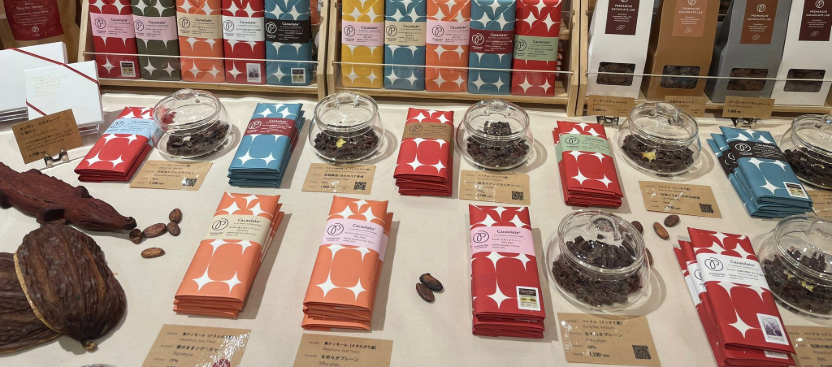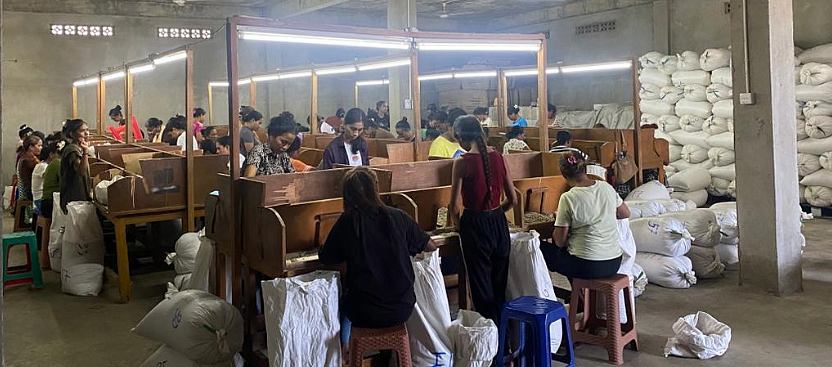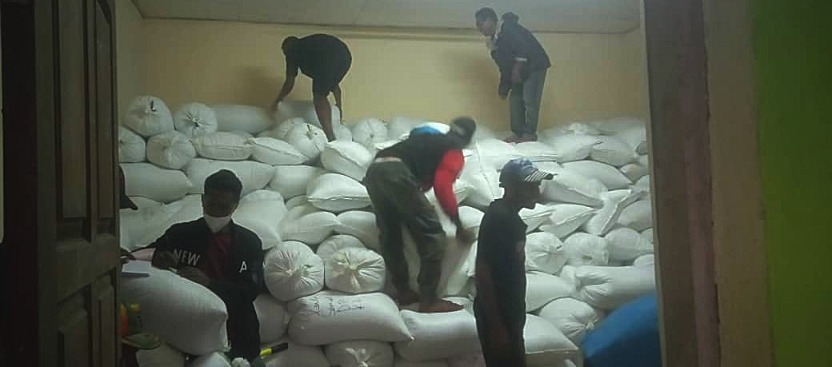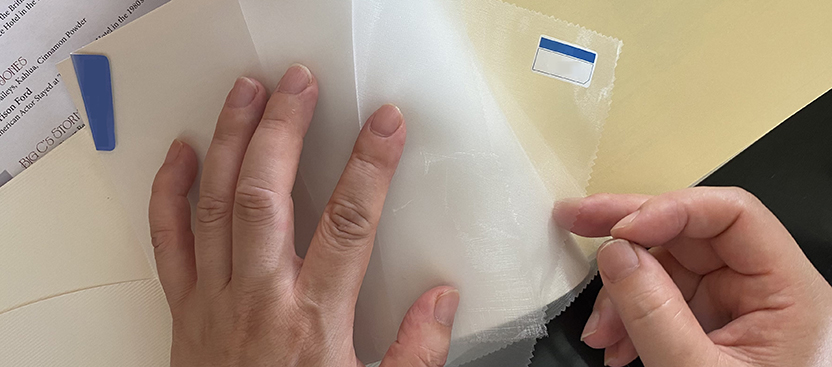デニヤヤの紅茶農家さんの暮らしについてインタビュー
2024/08/30
パルマルシェで販売しているルフナ紅茶とアールグレイ紅茶の茶葉は、スリランカ南部デニヤヤの60世帯の農家によって毎週、摘まれています。
農家は、それぞれの0.25~2エーカー(1エーカーは約4,046平方メートル)の有機茶畑から、毎日茶葉を収穫しています。一例を挙げると、0.25エーカーの茶畑を2人(通常は夫婦2人)で朝早くから午後までおよそ8時間かけて手摘みします。農家は週に一度、収穫に一番適している茶葉のみを摘み、翌週まで同じ畑収穫することはなく茶葉の成長を待ちます。その間は、有機茶畑の手入れに専念するか、副収入を得るために他の作物を植えたり収穫したりしています。
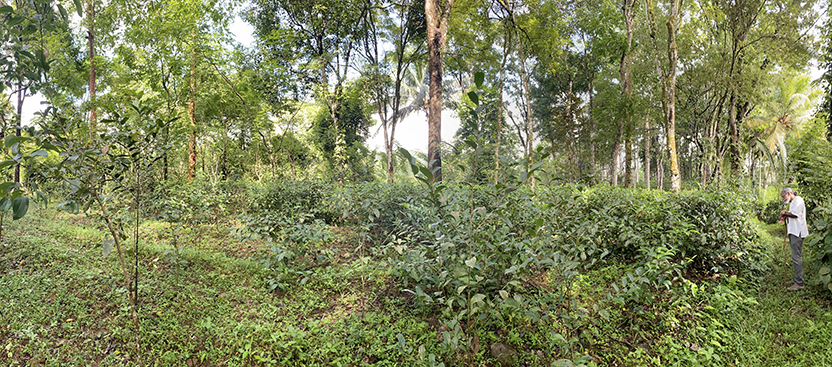
農家によって、生活の様子は大きく異なることがわかりました。
心不全やヒルによる深刻な足の感染症など、健康問題に悩まされている農家は、少しお金に余裕のある兄弟から援助を受けながら、子どもを学校に通わせ、どうにかやっと生活を送っているそうです。一方で、主に紅茶の生産を通して家を買い、子どもたちを学校に通わせ、充分な生活費を稼いだ上で少しは貯蓄に回せるような農民もいます。そういった農家たちにお話を聞いてみると、有機茶葉の生産を楽しみながらライフスタイルとしていて、デニヤヤの環境を守り、ひいては地球環境を守るというビジョンを持っていました。中にはスリランカの紅茶産業の将来を考えている農家もいました。
有機紅茶作りへの情熱を語ってくれた彼らの目は輝いていて、誇りと喜びが感じられました。
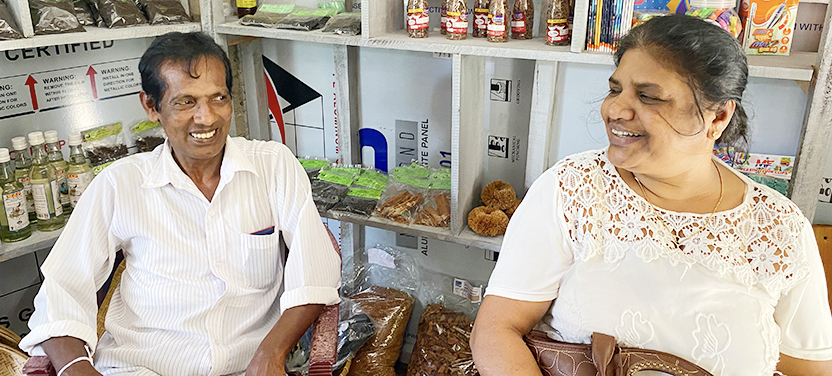
現在もスリランカでは厳しい経済状況が続いています。スリランカの人びとは2年前の経済危機からまだ完全には立ち直っておらず、生活費を稼ぐために、茶葉を一番手っ取り早く稼げるところへ売ることもあります。気候の変化による生産量の低下で充分に収入を得られない農家、茶葉の不足に頭を悩ませている工場、現場との歩調の合わない政策、これらも影響して紅茶業界における不安定な価格設定と需要にやはり一番影響を受けるのは零細農家や小規模な加工場です。年々変わる降雨のパターン、日差しの強さ、虫の発生や動物の移動パターンの変化など、生産に大きく影響する気候変動の中で、農家は最善を尽くし続けなければなりません。
パルマルシェでスリランカ産100%のルフナ紅茶とアールグレイ紅茶をお買い上げいただくことは、農家たちの情熱や努力を支えることにつながります。そして購入する私たちは、スリランカ産の最高品質のオーガニック紅茶を味わうことができます。
有機紅茶を手摘みする農家の方々の、細やかな心遣いが詰まった味わいを、一日のささやかなひと時としてお楽しみください。
The Ruhuna and Earl Grey tea sold on the Parmarche website is collected weekly from 60 farmer groups in Sri Lanka’s southern region called Deniyaya.
Each farmer works day in and day out to collect these tea leaves from their organic tea plantations, which range from 0.25-2 acres. Just to give you an idea, it takes 2 people (typically a husband and wife) a full day 8 hours of hand-plucking to get through 0.25 acres of tea field. Farmers pluck once a week to get the best part of the crop, and wait until the following week to pluck that same field. For the other days of the week, they focus on either non-organic tea farming, farming other crops they have planted, or working on other side-jobs to make extra income.
I found the range of livelihood and lifestyles that farmers had differed greatly from farmer to farmer. Some were barely making ends meet, receiving help from fellow more successful siblings to send their own children to school, and were wrought with health issues from heart failure to serious leg infections caused by leeches. And yet, I interviewed other farmers who were able to not only make ends meet but through mainly tea production, buy their house, send their kids to school and have a little more cushion in their income.
I can’t make sweeping generalizations but I found that the farmers who were doing well, were fully invested in organic tea production. It was a way of life, a lifestyle and something they enjoyed and thrived on. They have a vision of protecting their village environment, to the global environment through organic tea farming, and some were thinking ahead to the future of the Sri Lankan tea industry. There was a sense of pride and joy as their eyes twinkled speaking about their passion for tea making and their gratitude towards Parcic. I can’t say that the difference in output is purely from mindset only, but out of 8 farmer interviews, the 5 who were consistently making above 20kg per month for organic tea were mentioning similar comments about “tea making is a lifestyle”.
The current economic climate in Sri Lanka is tough. Sri Lankan residents are still recovering from the extreme financial crisis from 2 years ago, and sometimes selling to the fastest tea leaf buyer to make ends meet. Not to mention, factories have been suffering from a lack of supply from tea farmers as well as volatile pricing and demand in the tea industry and sweeping well-intentioned but catastrophic changes the Sri Lankan government makes with little on-the-ground experience. Furthermore, farmers have to continue to do their best in tea production amid climate change which affects rain patterns, sun strength, bug diversity, and animal migration patterns, which all significantly impact the amount of output farmers are able to produce. In this way the most affected are the small-scale farmers and small-scale factories who have to continue to put their best foot forward despite unstable conditions in recent years.
Your support in purchasing the 100% Sri Lankan origin Ruhuna tea and Earl Grey tea, contributes to the funds which support farmers and their efforts to create the finest organic tea from Sri Lanka into the palm of your hand. Please enjoy the taste of detailed care and dedicated passion that farmers committed to hand-picking the finest quality of Sri Lankan organic tea, into what we hope is a small breath of fresh air into your day.

